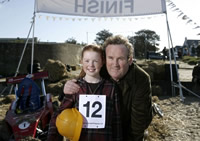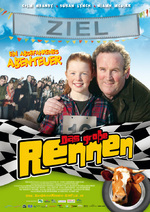“They could have been right… but they were not!”
 THE RACE tells about an Irish farming family collapsing while 11 year old daughter Mary is trying to make her dream come true: driving a go-kart and winning a race. Something she can only do with the support of her father, a grumpy farmer with enough problems of his own: agricultural crisis, his wife applying for a divorce and the sudden decline of fatherly authority. The film by André F. Nebe, starring debuting Niamh McGirr and Hollywood star Colm Meany as her father, is a true European co-production.
THE RACE tells about an Irish farming family collapsing while 11 year old daughter Mary is trying to make her dream come true: driving a go-kart and winning a race. Something she can only do with the support of her father, a grumpy farmer with enough problems of his own: agricultural crisis, his wife applying for a divorce and the sudden decline of fatherly authority. The film by André F. Nebe, starring debuting Niamh McGirr and Hollywood star Colm Meany as her father, is a true European co-production.
André F. Nebe: “In the first agreement 12 partners were included. Finally 3 countries got involved: Germany, Northern Ireland and the Irish Republic.”
 You didn’t go for the most obvious way to do it.
You didn’t go for the most obvious way to do it.
Nebe: “I can’t think of anyone else who did it before: going abroad for an international co-production as a debut. Every year 60 German students finish film school, usually they make their debut with a ‘no-budget film’, hoping to get offered a bigger production afterwards. For most of them that wish never get fulfilled: the producers will simply pick another young director to be squeezed out with another no-budget movie. It’s a sad story but unfortunately that’s the system we have. While I believe it makes sense to believe in someone and to take your time to build up something. It’s my aim to convince the world about that.”
What was your strategy?
Nebe: “The world is my home or I can make it my home. I wanted to make a European film with English dialogue so that it could be screened worldwide. Everybody told me: ‘That’s impossible. You’ll never make it.’ In all modesty: they could have been right… but they were not!”
Why Ireland?
Nebe: “In the minds of most people German directors make German movies. I, on the other hand, believe in the concept: European directors make European movies. I run my Tucano Film Company together with an Irish friend. We were considering projects from many countries, but THE RACE was the most manageable. I convinced the Irish Film Board with my earlier work and my show-reel and they saw some promotional profit in it for their country. They gave me a warm welcome in Northern Ireland.”
 You didn’t feel an intruder?
You didn’t feel an intruder?
Nebe: “Not at all! They’re used to foreigners coming in with big productions. Every year 3 to 5 Hollywood movies are shot in Ireland. I got a lot of freedom in developing the story. Together with the author Rowan O’Neill we made 10 drafts of the script and not a single time was there was any interference from our Irish partners. In Germany there’s always people smartassing around.”
You make it sound like Ireland is a wonderful location for shooting films.
Nebe: “We were shooting in Northern Ireland near Belfast and in the Irish Republic. Northern Ireland has thses really nice big valleys and an interesting coastline; we often paused to take ‘beauty shots’. Scriptwriter Rowan O’Neill grew up in this region. The hardest thing to find was a remote, ruinous farm now all rich farmers are building ugly new houses.”
 Why did you set the story in the past?
Why did you set the story in the past?
Nebe: “Did I? Actually we leave that open. There are no mobile phones and no laptops but we’re never explicit about the exact era. The script was originally set in the early nineties during the beef crisis when the whole business was breaking down due to the mad cow disease and the competition with cheap Argentine beef.”
The main character Mary is the strongest element in your film.
Nebe: “All my films have strong heroines. I like girl-empowering stories. In this film I wanted to create a character finding her own voice. Mary is still on the edge of being a child but really becoming someone. We meet her in a decisive moment in life. I like these rebellious characters, the ones who don’t give up. Mary never gives up.”
 Young actress Niamh McGirr is carrying the film on her shoulders.
Young actress Niamh McGirr is carrying the film on her shoulders.
Nebe: “She took some drama classes in school but she stood in front of a camera for the very first time. She’s modest and shy, but she can really lift herself up. That’s a natural talent you can’t teach anyone.”
How did you work with her?
Nebe: “In my opinion children should be directed in a different way from adults. Method acting isn’t for children. I used a mixture of directive tools such as associations and physical tasks and some result-orientated directing for certain looks and movements. That style of directing is more or less taboo but it works with children. If I tried result-orientated directing with Colm Meany he would probably punch me in the face.”
Did Niamh have some influence on the creative process?
Nebe: “Once we’re on the set I don’t stick to every single line in the script. All fighting scenes were created on the set because I wanted them to be lively and fresh. And sometimes Niamh changed some lines in her dialogues if they didn’t sound convincing.”
 Also the role of Mary’s mother is developed in a strong way. Like in the final scene when she’s watching her daughter getting her victory from a distance.
Also the role of Mary’s mother is developed in a strong way. Like in the final scene when she’s watching her daughter getting her victory from a distance.
Nebe: “She can only leave when she’s convinced that the father will pick up his parental role. The producer came to thank me personally for putting that scene in the film. For him it opened ways to start discussing his divorce with his own daughter. From our point of view it’s unbelievable that a woman as bright and beautiful as Mary’s mum would take all that shit from her husband. But in Ireland in the mid-nineties a woman leaving her family was unthinkable. At first Mary had no relation whatsoever with her unfriendly father. That changes throughout the story. It was our challenge to do that in a realistic, convincing way.”
How did you convince Colm Meany (THE VAN, THE SNAPPER, RAINING STONES,…) to do your film?
Nebe: “He liked the script and my previous work and had time to do it. He is an absolute professional: he knows that when he turns his face to the camera, it will work. And he is Irish, so he has a strong mind of his own.”
How did you shoot the kart scenes? Was there any engineering involved?
Nebe: “Most of the karts we found in races in Northern Ireland. Even the washing machine on wheels already existed. Irish people race with whatever has an engine and they gather in constructors’ clubs. Our art department only had to build 2 or 3 original karts, like Mary’s kart and the bathtub on wheels.”
What are your expectations now THE RACE is touring the festival circuit?
Nebe: “More festivals! THE RACE was released in Germany on 60 copies on 29th October. The rights have been sold to France, Belgium, Austria, UK etc. and we closed a DVD-deal with the US.”
Meanwhile you’re trying to get your next project financed.
Nebe: “I’m constantly searching for a good script, which is hard to find, especially for children’s films in need of a certain kind of quality level. THE SUPERTHIEVES again will have a strong girl in the main role. I want to make a sort of OCEAN’S ELEVEN for children: elegant, cool, funny, with a bit of action. That’s something for 2011 at it’s earliest. Meanwhile I’m happy to read scripts. So writers, don’t be too shy to send me your stories.”
Gert Hermans
